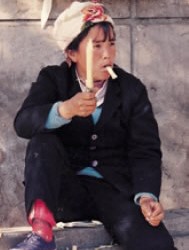Naru in China

Photo Source:
Copyrighted © 2026
Operation China, Asia Harvest All rights reserved. Used with permission |
Send Joshua Project a map of this people group.
|
| People Name: | Naru |
| Country: | China |
| 10/40 Window: | Yes |
| Population: | 15,000 |
| World Population: | 15,000 |
| Primary Language: | Language unknown |
| Primary Religion: | Ethnic Religions |
| Christian Adherents: | 0.00 % |
| Evangelicals: | 0.00 % |
| Scripture: | Unspecified |
| Ministry Resources: | No |
| Jesus Film: | No |
| Audio Recordings: | No |
| People Cluster: | Tibeto-Burman, other |
| Affinity Bloc: | Tibetan-Himalayan Peoples |
| Progress Level: |
|
Introduction / History
The Naru claim they originated in Hunan and Jiangxi provinces in eastern China in ancient times. They were probably Chinese soldiers who were sent to patrol northern Yunnan Province. Over the centuries the descendants of the original soldiers intermarried with local Yi tribeswomen and gradually developed into a distinct ethnic group. One source claims, "The Naru are certain to have once been the same people as the Naruo with whom they now have only mild cultural and linguistic differences."
The Naru have been officially included under the Yi nationality in China, even though they retain a separate ethnicity and history from other Yi groups. The Naru are called Shuitian (Watery Fields People) by the Chinese. This name, used by the Chinese for several small Yi groups, is not used by any of the groups to describe themselves.
What Are Their Lives Like?
When a Naru couple decides to get married, they tell their parents who then arrange for a meeting. Both sets of families come together and "engage in a whiskey drinking ceremony after which they playfully argue about the number of gifts to be given and received until a compromise is reached. Rice whiskey also plays an important role in the actual wedding. If all the guests don't drink in agreement, then the couple cannot be considered married. Naru weddings are usually very festive and expensive occasions participated in by some 200 guests."
What Are Their Beliefs?
The center of a Naru home is the kitchen fire-pit. "A day of grazing goats, cows and mules and working the corn, rice or tobacco fields climaxes around the lapping flames of the family fire-pit as the smoke wends its way through the open rafters. While gazing into the flames, all smoke their tobacco bongs or long-pipes and engage in story-telling and laughter." The Naru worship a spirit that they believe actually resides in the fire-pit. They also worship their ancestors and experience more Daoist and Buddhist influence than most other Yi groups. This is possibly due to their origins as Chinese soldiers.
The remote mountains of Yongsheng and Huaping counties have been formidable barriers to the introduction of the gospel into the area. Before the 1960s there were few roads in the region. As a result, no long-term missionary work was ever undertaken in this part of China. Today the Naru are an unreached people group with no church or believers.
What Are Their Needs?
The Naru people have few if any opportunities to experience the abundant life that comes from fellowship with the King of kings. Who will go to them?
Prayer Points
Daoism and Buddhism influences their animism. Pray they will no longer oppose missional outreach.
May God reveal himself to them so they understand the difference between the Lord and lords and disembodied spirits.
Pray they stop aborting girls.